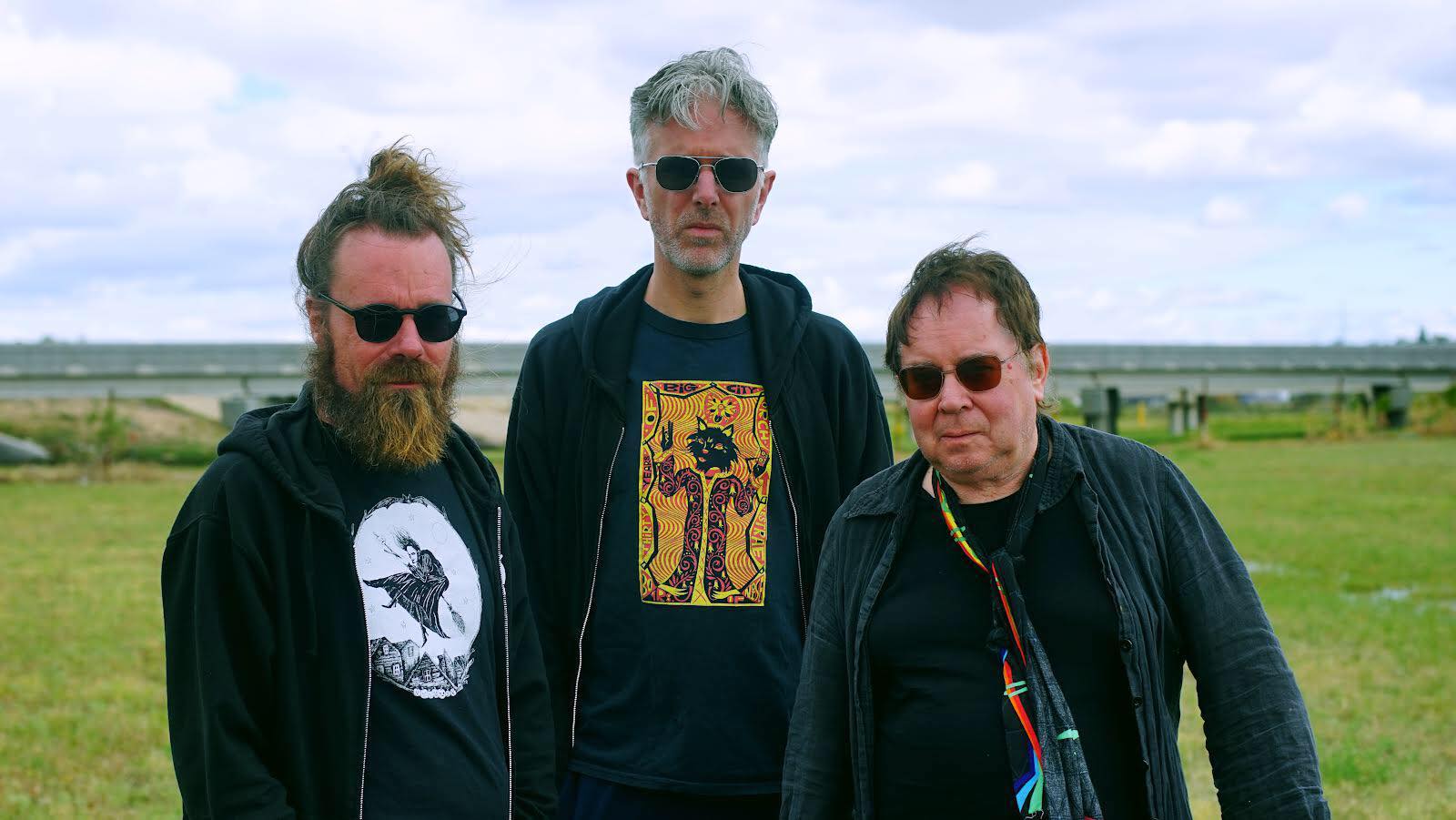
LPDs: Randall Frazier (from left), Erik Drost, and Edward Ka-Spel. Photo by Joep Hendrikx.
As memories of the COVID-19 pandemic and quarantine-time behaviors become a distant bad memory, the era has left impressions on the collective subconscious that are both subtle and monumental. This is where one finds The Museum of Human Happiness, the latest offering from London-based psychedelic musical explorers the Legendary Pink Dots.
Since August of 1980, the group’s enigmatic leader and vocalist Edward Ka-Spel has released a seemingly endless chain of albums, cassettes, and CDs with the Pink Dots, with various side projects, and under his own name. After more than 40 years in the group, Ka-Spel’s longtime friend, keyboard player, and co-founding member of the Dots Phil “The Silverman” Knight has retired from touring. But the show must go on. In the Silverman’s stead, keyboard player Randall Frazier of Bailey, CO’s Orbit Service has stepped into the fold. Ka-Spel checked in just as rehearsals were beginning for the group’s first trek in the brave new world with its newly configured lineup to tackle what he says is the most complicated set he’s ever performed.
The last time I saw the Legendary Pink Dots play live was in November 2019 for the Angel In the Detail tour. Was that the last time you played in the States?
Yes, we played a European leg of that same tour that finished on February the 29, 2020. That was when the pandemic really broke out everywhere. That was the last time we played live. To be honest it’s been a bit nerve-wracking coming back after nearly three years. It was a long and lonely stretch. I am happy to be playing shows, but it’s a real challenge.
What have the days been like for you leading up to playing live again?
Oh, frenetic. Today was absolutely frenetic. I got up at around 7:30 a.m., and the rest of the guys went into Denver to arrange for keyboard stands, and to get some mailers. I’ve got a lot of stuff to send out to people. Basically, I’ve brought all of the stuff with me from Europe so I can mail it out while I’m here.
While the guys were out picking up things I worked on the setlist and developed keyboard parts and collages.
I have also been going through songs in my head. Lyrically, this is the most complicated set I have ever had. I didn’t realize how intense the lyrics were in some of these songs. Some of them move quite fast from the start, like runaway horses. If you drop a word suddenly you’re lost. You have to keep up with it. It’s nice to have a challenge, though, and it is a big challenge. We’re playing a lot of new songs. It’s what we’re feeling right now, so it makes sense. There are a couple of older ones in there as well, but just what we really wanted to play.
You have the lineup in place: Erik Drost is playing guitar, Joep Hendrikx is handling some live engineering and effects, and Randall Frazier is on synths, samples, and some vocals. But no Silverman this time around?
Phil is basically retired. Neither one of us are Spring chickens anymore, and, in a sense, Phil felt that it was time to hang up his keyboard. It’s a bit sad. I understand it, but I can’t do that myself.
What else would you do?
That’s exactly it! “What else would you do?” There are days when I feel a bit fatigued, but then I think about someone like Marshall Allen [leader of the Sun Ra Arkestra]. If he has the energy to do it at 98, surely, with 30 years to spare, I should be able to deliver.
This is the first Legendary Pink Dots tour without Silverman that I am aware of. Having gone through the process with him for so long, I imagine you’re sort of like each other’s support system on stage.
It’s true. It will be kind of strange being on tour without him. We have known each other for decades. We used to share hotel rooms after shows. But in some ways, I saw it coming. He wasn’t so involved in the last album, for instance. It was clear to me that he was withdrawing. It was also very hard with the pandemic raging on. He lives alone, so it was much harder for him than it was for someone like me. We were all absolutely tied to where we lived because there was nowhere to travel anyway.
I have family around me, and I had tremendous support from my wife who was always behind me. I tried to persuade him to keep going. I also asked: “What else will you do?” But he was ready to retire, and he has that right.
Are you playing the older songs differently now?
Oh yeah! But that would be the case even if he was still in the band. The songs have to grow and fit with how we feel at the time we play them. Otherwise it feels a little like karaoke, and karaoke doesn’t really fit with us.
There is always room for improvisation in your live sets.
We plan a set because it’s good to have this base, a rock that we can sit on, lean on. But we’ll decorate that rock more as we go, and find new little corners of the rock that weren’t apparent when we began. And this is a very complicated rock for this tour.
I once asked Marshall Allen about the improvisational element in his music. He described it as making music on a spiral. It’s constantly moving around and influenced by “the spirits of the day” that he encounters along the way. That’s a poignant way to explain how these songs—you know them when you hear them—are played a little differently each time.
That’s how it should be. It shouldn’t just be a “Let’s repeat the album as it is.” The album is just a starting point for the songs.
Is it the pace of the songs that makes them challenging?
The pace and the lyrics are quite complex. You have to run with the whole thing. Every song tells a story, and you have to keep up with it. Sometimes you might forget something, or have one little word dropped, and the whole thing’s off. Until it’s a part of me—it will always be a part of me— where I can just flip it out without looking at any kind of prompt, then I’ll know that I can at least relax, just a little bit.
You have released a lot of records over the years. Do you have a mental map of what’s on the records or is it just too much to retain?
There are so many records. I can’t keep up. It’s like you find a place when you’re on a tour, which is right for that moment. To dig deeper into history would complicate that moment a little too much.
Not too long ago I started writing a concert announcement for your Atlanta show and I had to stop to think about it: The Museum of Human Happiness is the proper new record. But so many releases have appeared on Bandcamp since then—both Legendary Pink Dots and your solo recordings. I think of it all as Edward Ka-spel’s music, but I lose the priority and the order sometimes.
It has something to do with the way the album was written. There were many songs in the pot when I started it. It was my wife who said, “You really want to zoom in on the songs that would create The Museum of Human Happiness. The absolute cream on the Milk. It was the same time as my solo album, Prints of Darkness. So a lot of what didn’t fit Human Happiness made it onto Prints of Darkness.
Since then, the pandemic has gone on, and I needed to keep writing and recording. It keeps you on your toes. There have been quite a few hours of that since then, and of course, there’s a new Chemical Playschool. Then there’s what I call the quarantine releases, and the 3 2s and a zero releases. There were four of those this year: Conspiracy of Pylons, The Concrete Diaries, Tales From The Trenches, and 100 Seconds To Midnight. It has all moved on since Prints are Darkness.
On the subject of The Museum of Human Happiness, do you think of it as a pandemic album? Is it a comment on social media?
It’s a place from a sad, dystopian future that I thought of. What will it be like when we literally have to live underground, and there will be reminders of what was on the surface. There’ll be this museum with all these things that reflect what was. Many songs are about the Pandemic. “Hands, Face Space,” “Coronation Street.” It’s a very British album. “Cruel Britannia” speaks for itself. I don’t like the way things are going in the UK at the moment. All of this right wing politics just sucks, to be honest.
Things aren’t a lot different in the U.S. at the moment.
I don’t understand what’s happened to the anglo-saxons. It’s like we’ve completely lost the plot. I don’t understand this kind of exclusion of whole swathes of human beings. The selfishness and the absolute hate that go along with it; why is it being stirred up by people who should know better?
I’m very fond of “Cruel Britannia” and “Nightingale.” Those two are very much like what I was going through during the pandemic. Nightingales were actually these strange hospital warehouse type things that were set up in the UK during the pandemic. It was obvious what they were. They literally were filled with hundreds of beds with ventilators next to them. But they never actually used them as far as I know. But they set them up all over the country. They don’t exist anymore. If they used them, they only used them very briefly. But it was obvious what they were—the end of the line. It’s like they expected things to get much much worse.
The lyrics aren’t about that exactly. The lyrics are about someone who’s subjected to a medical experiment.
What was the first song that you wrote for the record?
Probably “This Is the Museum.” It actually came from my daughter Alice. She came up with the idea. I think she wrote a poem called “The Museum of Happiness,” and I said wow, “The Museum of Happiness.” Do you mind if I use that, Alice?” She said of course you can use it! It’s really nice. I added the “Human” in there. Then I wrote the song, “This Is the Museum.” She really liked it and she wrote another poem which is a little bit based on my poem. It was really kind of nice. But yeah, she inspired that.
That’s why she gets a songwriting credit on the album.
Oh yeah, she’s credited on the album. When she said that, I just suddenly had the whole picture of this place, this museum, like a very modern underground.
Sometimes someone can just say something and you get this whole picture. It’s like a seed that just explodes and suddenly there’s a whole story and scenario there that you have to realize. And you have to capture it before it disappears. You dare not wait, because if you wait it’ll be gone.
I can imagine that after not having done it for so long, it has to be a rush.
Totally. And that’s just the rehearsals. To actually do it in front of people will be another thing. I’m also nervous about it, I can’t deny it.
Do you often get nervous before you play shows?
Yeah, I’d say so. It’s odd. When we’re performing, we all obsess over the little mistakes that could be made. Mistakes that, in reality, nobody hears. In the past, for example, when we’d play a song using physical sequences, they all started speeding up. So what do you do? You speed up with it! Still, nobody noticed. But how could you not notice that?
You can call it improvisation!
Yeah, really! That’s a moment when we’ve all gotta think of something to do, right in this split second.
Randall Frazier has stepped into the Legendary Pink Dots. He’s performing the duties that Phil has traditionally handled?
Sort of. We want Randall to be Randall, and to do what he feels is right for the songs. Not simply reach for a line that’s already there, but to take his own lines and his own parts because then the music becomes his as well.
He’s also a sound engineer. Actually, in this touring party there are three sound engineers in the group. So if something goes amuck, there should be a solution in there somewhere, and they’ll find it.
Way back in the ‘90s, Orbit Service was a much larger band with more members. They opened for the Legendary Pink Dots in Denver at the Bluebird Theater. Since then, we’ve played on records together and done a few tours together. To me, Randall is family, and he has been for a long time. Now he’s on the front line as well.
The Legendary Pink Dots and Orbit Service play Purgatory at the Masquerade on Friday, November 4. $22.50 (adv.). 7 p.m.
Source: RAD/ATL


